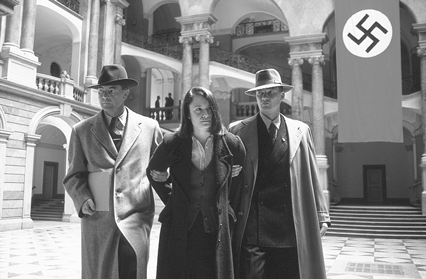Black and white and tread all over
At last year’s New York Film Festival, a journalist asked Austrian director Michael Haneke if he knew any people who don’t lie. He said “Yes, but they don’t make very interesting characters.” Marc Rothemund’s real-life heroine Sophie Scholl was a very good liar, as it turns out, but he turns her anti-Nazi resistance into a form of secular sainthood.
The template for “Sophie Scholl-The Final Days” comes from Carl Dreyer’s silent classic “The Passion of Joan of Arc”—a radiant young woman being endlessly tormented by physically and spiritually ugly middle-aged men. In order to work, it needs excellent acting. Dreyer’s star Maria Falconetti gives one of the greatest performances in film history. It’s one that’s never been duplicated, not even in films about Joan of Arc by directors as great as Robert Bresson and Roberto Rossellini. Julia Jentsch, who plays Scholl, is very good, but she can’t carry the entire film on her shoulders.
In 1943, a group of Munich college students set out to resist the Third Reich. They were particularly revolted by the massive carnage at Stalingrad. Calling themselves the White Rose, they distribute flyers expressing their political views around Munich and other German cities. Sophie Scholl and her brother Hans (Fabian Hinrichs) decide to go drop them off at a college campus. Entering the huge building that houses its psychology department, they find the place deserted, having carefully chosen a time when every student will be in class. They walk around, leaving the flyers, but get caught as they’re about to leave. Sophie impulsively knocks over a stack of them, sending them falling over the horde of students exiting class. She and her brother are arrested and interrogated by the Gestapo.
Fred Breinersdorfer’s semi-documentary script is based on recently discovered historical texts and interview transcripts. All the same, large sections of the film feel like a mediocre cop show. It’s marred by the fact that most of it consists of interrogation scenes. Done well, they can be gripping—as in the “Homicide: Life On The Street” episode “Three Men and Adena”—but in “Sophie Scholl-The Final Days,” they feel like a rote procession of clichés about Nazi ideology. For all Breinersdorfer’s research, any college student who took a class on the Third Reich could have come up with the dialogue he gives to Gestapo agents and fascist judges.
If Scholl is an absolute saint, her tormentors are absolute villains. The film’s sense of morality is black and white. I’m certainly not asking for sympathetic Nazis, but Scholl and her interrogator are so diametrically opposed that one could easily forget that they’re products of the same society. “Sophie Scholl-The Final Days” never digs deeply either into the roots of Nazism or resistance to it. It assumes—correctly, of course––that the spectator will be on Scholl’s side and avoids emphasizing just how extraordinary her behavior was. The film winds up making it look as though every German in 1943 was either a swastika-worshipping hardcore Nazi or a rebel.
All the same, Scholl is a fascinating character. During the interrogations, she rarely shows any signs of weakness, but she lets her vulnerability out in private. She cries when alone in the bathroom and in the company of her cellmate, a friendly middle-aged woman. She starts out determined to lie to her interrogator as long as she possibly can, concocting an elaborate story about visiting friends in a Munich suburb, and carries it off well for quite a while. Even when her brother confesses and her story breaks down, she remains utterly dignified.
The quality of Jensch’s performance, however, points up the weaknesses of others.’ Almost every actor who plays a Nazi uses the occasion to chew the scenery and demonstrate his screaming skills.
“Sophie Scholl-The Final Days” betrays a fundamental inability to turn its ideas into compelling drama. Apart from a few views of great German architecture, the direction mostly serves the dialogue—the scenes between Scholl and Gestapo agent Robert Mohr (Alexander Held) are shot and edited with little imagination. The dialogue strives to honor a real heroine, but it winds up idealizing her instead. The end credits incorporate photos of the real Scholl, who shows a capacity for pleasure missing from her fictional incarnation.
Michael Verhoeven’s 1982 film “The White Rose” has already told much of the story, to greater effect. To its credit, Rothemund’s film contains a remarkable lead performance, but it brings little new to the table.
gaycitynews.com


































